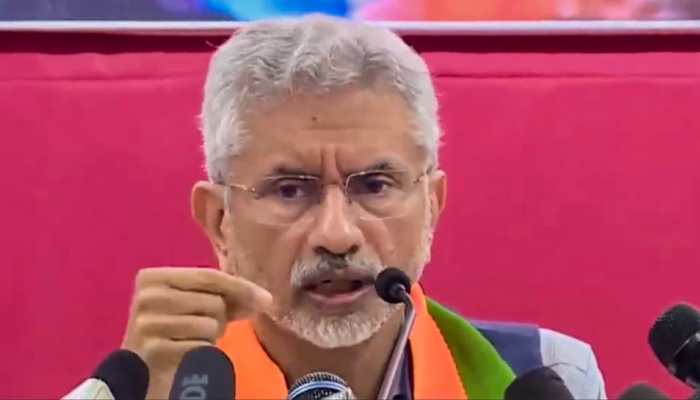'This India Will Not...': EAM Recalls 26/11 Mumbai Terror Attacks, Says Country Standing Strong
Speaking to reporters in Mumbai, the EAM emphasized that there should not be a repeat of what happened in Mumbai.
Trending Photos
) Union External Affairs Minister S Jaishankar addresses a press conference, in Mumbai. (PTI Photo)
Union External Affairs Minister S Jaishankar addresses a press conference, in Mumbai. (PTI Photo) Jaishankar On LAC: External Affairs Minister S Jaishankar on Sunday recalled the 26/11 Mumbai terror attacks and said that there was no response from the Indian side back then. He asserted that it won’t be the case if such an incident were to recur.
Speaking to reporters in Mumbai, the EAM emphasized that there should not be a repeat of what happened in Mumbai. “We should not have a repeat of what happened in Mumbai. That there was a terror attack and there was no response.” “Mumbai is a symbol of counter-terrorism for India and the world,” the Union Minister said.
When India was a member of the UN Security Council, it was chairing the counter-terrorism committee, Jaishankar said. “We held the counter-terrorism panel meeting in the same hotel that was hit by the terror attack,” he futher stated. “People know that India is standing strong against terrorism. We are today leaders in fighting terrorism,” Jaishankar said.
“When we talk of zero tolerance against terror, it is clear that when somebody does something, there will be a response,” he said. “We also have to expose. It is not acceptable that you are doing business during daytime and indulging in terror during the night and I have to pretend that everything is okay. “This India will not accept it. This is what has changed,” the minister said. “We will expose terrorism and we will act where we have to act,” he added.
Days after breakthrough agreement with China, Jaishankar said that India and China would soon resume patrolling along the Line of Actual Control (LAC) in Ladakh and restore the arrangement as it was in April 2020, before the border standoff began. “We expect to return to pre-October 31, 2020, patrolling arrangements in areas like Demchok and Depsang. This will take some time,” the EAM said.
This comes a day after the EAM said that the breakthrough agreement with China on patrolling along the LAC does not mean that issues between the two countries have been resolved; however, the disengagement allows us to look at the next step. He credited the military, which worked in "very very unimaginable" conditions, and deft diplomacy for the breakthrough agreement with China.
At an event in Pune on Saturday, Jaishankar said, "The latest step (of disengagement) was the October 21 understanding that patrolling will take place in Depsang and Demchok. This will allow us now to look at the next step. It is not like everything has been resolved but the disengagement, which is the first phase, we have managed to reach that level."
Responding to a query during a separate interaction with students, the EAM said that it is still a bit early for normalization of relations, which will naturally take time to rebuild a degree of trust and willingness to work together.
He said when PM Narendra Modi met Chinese President Xi Jinping at Kazan in Russia for the BRICS summit, it was decided that the foreign ministers and National Security Advisors of the two countries would meet and see how to move forward.
"If today we have reached where we have... one is because of the very determined effort on our part to stand our ground and make our point. The military was there (at LAC) in very, very unimaginable conditions to defend the country, and the military did its part and diplomacy did its part," Jaishankar said.
Over the decade, India improved its infrastructure, he said, adding that part of the problem is that in the earlier years, the border infrastructure was really neglected.
"Today we have put in five times more resources annually than there used to be a decade ago, which is showing results and enabling the military to actually be effectively deployed. The combination of these factors has led to where it is," he said.
Earlier this week, India announced it had reached an agreement with China on patrolling along the LAC in eastern Ladakh, a major breakthrough in ending the over four-year-long military standoff.
Since 2020, the situation on the border has been very disturbed, which understandably negatively impacted the overall relationship. Since September 2020, India has been negotiating with the Chinese to find a solution, he said.
The EAM said there were different aspects of this solution. The pressing one is disengagement because troops are very close to each other and the possibility of something happening existed. Then there is de-escalation because of troop buildup on both sides, he added.
"There is a larger issue of how you manage the border and negotiate the boundary settlement. Right now everything that's going on is concerning the first part, which is disengagement," he said.
He said that the two neighbouring nations came to an understanding at some places after 2020 on how troops return to their bases, but a significant segment was related to patrolling. "There was blocking of patrolling, and that is what we had been trying to negotiate for the last two years. So what happened on October 21 was that in those particular areas, Depsang and Demchok, we reached an understanding that patrolling would resume how it used to be before," Jaishankar added.
Following the agreement, the two countries have begun troop disengagement at the two friction points at Demchok and Depsang Plains in eastern Ladakh, and this process is likely to be completed by October 28-29.
(With PTI Inputs)
Stay informed on all the latest news, real-time breaking news updates, and follow all the important headlines in india news and world News on Zee News.
Live Tv







)
)
)
)
)
)
)
)
)
)
